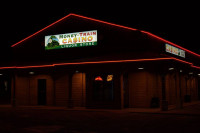Montana Casinos
Average Rating 3.0 / 5
Top Rated Online Casinos for Montana
up to
test
Sort By
Casino is closed



200,00$
-
800,00$
Montana Casino Information
Montana has 511 casinos in which you'll find more than 7,532 slots and gaming machines. There are a total of 8 table games. The minimum bet we've found at casinos in Montana is $0.01 and the maxium bet is $100. Click a casino on the left for more information on a particular property.
If you wish to stay at some nice casino hotels in Montana, visit the Montana casino hotels page. We actually have 21 Montana hotels you can book directly from World Casino Directory. Click here to see a list of all Montana hotels available.
There is poker in Montana! You will find over 24 live poker tables to play at. You will find the following games in Montana casinos: No Limit Holdem, Texas Hold'em, Omaha, Omaha Hi-Lo, 7 Card Stud, Dealers Choice, NL Texas Hold'em, Tournaments, Omaha Hi, Omaha Hi-Lo Split, Draw, 5 Card Stud, Stud, Sit-n-go, Five Card Draw, Omaha 8 or Better, Pot Limit Hold 'Em, Tahoe Hi-Low, NL Holdem, Razz, 7 Card Stud Hi-Lo, Spread Limit Hold 'em, 7 Card Poker. Some Montana casinos also offer convention centers and meeting spaces. Over the entire town, you will find a total of 65,607 conference sq/ft space in the various casino properties.
Montana Casinos and Gambling Facts
Montana Casinos and the Biggest Casino City in Montana
Montana has a total of 511 casinos and pari-mutuel facilities at your disposal which are spread out across 104 cities throughout the state. The city with the most is Billings with 95 casinos.

Biggest Casino / Gaming Facility in Montana
Out of all casinos in Montana you'll find Buffalo Rivers Casino & Lodge to be the biggest. It has 406 gaming machines and 0 table games. You can reach South Point Casino by clicking this link: Buffalo Rivers Casino & Lodge to see its information page.
2nd Biggest Casino / Gaming Facility in Montana
Coming in second place for largest casino in Montana is Gray Wolf Peak Casino with 307 gaming machines and 0 table games. This casino can be reached by calling (406) 726-3778 or by clicking this link: Gray Wolf Peak Casino to see its information page.
Largest Casino Floor in Montana
The casino with the largest gaming space in square footage is Charging Horse Casino & Bingo with 19,000 square feet of gaming space. Contact Charging Horse Casino & Bingo by calling (406) 477-8188 or by clicking here: Charging Horse Casino & Bingo Information.
Gambling Law
Article III, Section 9 Gambling. All forms of gambling, lotteries, and gift enterprises are prohibited unless authorized by acts of the legislature or by the people through initiative or referendum.
Montana State Code
23-5-110. Public policy of state concern
ing gambling.
(1) The legislature finds that for the purpose of ensuring the proper gambling environment in this state it is necessary and desirable to adopt a public policy regarding public gambling activities in Montana. The legislature therefore declares it is necessary to:
(a) create and maintain a uniform regulatory climate that assures players, owners, tourists, citizens, and others that the gambling industry in this state is fair and is not influenced by corrupt persons, organizations, or practices;
(b) protect legal public gambling activities from unscrupulous players and vendors and detrimental influences;
(c) protect the public from unscrupulous proprietors and operators of gambling establishments, games, and devices;
(d) protect the state and local governments from those who would conduct illegal gambling activities that deprive those governments of their tax revenues;
(e) protect the health, safety, and welfare of all citizens of this state, including those who do not gamble, by regulating gambling activities; and
(f) promote programs necessary to provide assistance to those who are adversely affected by legalized gambling, including compulsive gamblers and their families.
(2) The legislature adopts the policy that an applicant for a license or permit or other department approval under parts 1 through 8 of this chapter does not have a right to the issuance of a license or permit or the granting of the approval sought. The issuance of a license or permit issued or other department approval granted pursuant to the provisions of parts 1 through 8 of this chapter is a privilege revocable only for good cause. A holder does not acquire a vested right in the license or permit issued or other department approval granted. A license or permit issued under parts 1 through 8 of this chapter may not be sold, assigned, leased, or transferred.
(3) Revenue to fund the expense of administration and control of gambling as regulated by parts 1 through 8 of this chapter must be derived solely from fees, taxes, and penalties on gambling activities, except the gambling activities of the Montana state lottery and the parimutuel industry.
23-5-111. Construction and application. In view of Article III, section 9, of the Montana constitution, parts 1 through 8 of this chapter must be strictly construed by the department and the courts to allow only those types of gambling and gambling activity that are specifically and clearly allowed by those parts.
23-5-112. Definitions.
Unless the context requires otherwise, the following definitions apply to parts 1 through 8 of this chapter:
(1) “Applicant” means a person who has applied for a license or permit issued by the department pursuant to parts 1 through 8 of this chapter.
(2) “Application” means a written request for a license or permit issued by the department. The department shall adopt rules describing the forms and information required for issuance of a license.
(3) “Associated gambling business” means a person who provides a service or product to a licensed gambling business and who:
(a) has a reason to possess or maintain control over gambling devices;
(b) has access to proprietary information or gambling tax information; or
(c) is a party in processing gambling transactions.
(4) “Authorized equipment” means, with respect to live keno or bingo, equipment that may be inspected by the department and that randomly selects the numbers.
(5) “Bingo” means a gambling activity played for prizes with a card bearing a printed design of 5 columns. The letters B-I-N-G-O must appear above the design, with each letter above one of the columns. More than 75 numbers may not be used. One or more numbers may appear in each square, except for the center square, which may be considered a free play. Numbers must be randomly drawn using authorized equipment until the game is won by the person or persons who first cover one or more previously designated arrangements of numbers on the bingo card.
(6) “Bingo caller” means a person 18 years of age or older who, using authorized equipment, announces the order of the numbers drawn in live bingo.
(7) “Bingo session” means all activities incidental to a series of bingo games conducted by a licensed operator beginning when the first bingo ball is drawn in the first game of bingo.
(8) “Card game table” or “table” means a live card game table:
(a) authorized by permit and made available to the public on the premises of a licensed gambling operator; or
(b) operated by a senior citizen center.
(9) “Card game tournament” means a gambling activity for which a permit has been issued involving participants who pay valuable consideration for the opportunity to compete against each other in a series of live card games conducted over a designated period of time.
(10) “Dealer” means a person with a dealer’s license issued under part 3 of this chapter.
(11) “Department” means the department of justice.
(12) “Distributor” means a person who:
(a) purchases or obtains from a licensed manufacturer, distributor, route operator, or operator equipment of any kind for use in gambling activities; and
(b) sells the equipment to a licensed manufacturer, distributor, route operator, or operator.
(13)
(a) “Gambling” or “gambling activity” means risking any money, credit, deposit, check, property, or other thing of value for a gain that is contingent in whole or in part upon lot, chance, or the operation of a gambling device or gambling enterprise.
(b) The term does not mean conducting or participating in a promotional game of chance and does not include amusement games regulated by Title 23, chapter 6, part 1.
(c) The term does not include social card games of bridge, cribbage, hearts, pinochle, pitch, rummy, solo, and whist played solely for prizes of minimal value, as defined by department rule.
(14) “Gambling device” means a mechanical, electromechanical, or electronic device, machine, slot machine, instrument, apparatus, contrivance, scheme, or system used or intended for use in any gambling activity.
(15) “Gambling enterprise” means an activity, scheme, or agreement or an attempted activity, scheme, or agreement to provide gambling or a gambling device to the public.
(16)
(a) “Gift enterprise” means a gambling activity in which persons have qualified to obtain property to be awarded by purchasing or agreeing to purchase goods or services.
(b) The term does not mean:
(i) a cash or merchandise attendance prize or premium that county fair commissioners of agricultural fairs and rodeo associations may give away at public drawings at fairs and rodeos;
(ii) a promotional game of chance; or
(iii) an amusement game regulated under Title 23, chapter 6.
(17) “Gross proceeds” means gross revenue received less prizes paid out.
(18) “House player” means a person participating in a card game who has a financial relationship with the operator, card room contractor, or dealer or who has received money or chips from the operator, card room contractor, or dealer to participate in a card game.
(19) “Illegal gambling device” means a gambling device not specifically authorized by statute or by the rules of the department. The term includes:
(a) a ticket or card, by whatever name known, containing concealed numbers or symbols that may match numbers or symbols designated in advance as prize winners, including a pull tab, punchboard, push card, tip board, pickle ticket, break-open, or jar game, except for one used under Title 23, chapter 7, under part 5 of this chapter, in a bingo game approved by the department under part 4 of this chapter, or in a promotional game of chance approved by the department; and
(b) an apparatus, implement, or device, by whatever name known, specifically designed to be used in conducting an illegal gambling enterprise, including a faro box, faro layout, roulette wheel, roulette table, craps table, or slot machine, except as provided in 23-5-153.
(20) “Illegal gambling enterprise” means a gambling enterprise that violates or is not specifically authorized by a statute or a rule of the department. The term includes:
(a) a card game, by whatever name known, involving any bank or fund from which a participant may win money or other consideration and that receives money or other consideration lost by the participant and includes the card games of blackjack, twenty-one, jacks or better, baccarat, or chemin de fer;
(b) a dice game, by whatever name known, in which a participant wagers on the outcome of the roll of one or more dice, including craps, hazard, or chuck-a-luck, but not including activities authorized by 23-5-160;
(c) sports betting, by whatever name known, in which a person places a wager on the outcome of an athletic event, including bookmaking, parlay bets, or sultan sports cards, but not including those activities authorized in Title 23, chapter 4, and parts 2, 5, and 8 of this chapter;
(d) credit gambling; and
(e) internet gambling.
(21)
(a) “Internet gambling”, by whatever name known, includes but is not limited to the conduct of any legal or illegal gambling enterprise through the use of communications technology that allows a person using money, paper checks, electronic checks, electronic transfers of money, credit cards, debit cards, or any other instrumentality to transmit to a computer information to assist in the placing of a bet or wager and corresponding information related to the display of the game, game outcomes, or other similar information.
(b) The term does not include the operation of a simulcast facility or advance deposit wagering with a licensed advance deposit wagering hub operator allowed by Title 23, chapter 4, or the state lottery provided for in Title 23, chapter 7. If all aspects of the gaming are conducted on Indian lands in conformity with federal statutes and with administrative regulations of the national Indian gaming commission, the term does not include class II gaming or class III gaming as defined by 25 U.S.C. 2703.
(22) “Keno” means a game of chance in which prizes are awarded using a card with 8 horizontal rows and 10 columns on which a player may pick up to 10 numbers. A keno caller, using authorized equipment, shall select at random at least 20 numbers out of numbers between 1 and 80, inclusive.
(23) “Keno caller” means a person 18 years of age or older who, using authorized equipment, announces the order of the numbers drawn in live keno.
(24) “License” means a license for an operator, dealer, card room contractor, manufacturer of devices not legal in Montana, sports tab game seller, manufacturer of electronic live bingo or keno equipment, other manufacturer, distributor, or route operator that is issued to a person by the department.
(25) “Licensee” means a person who has received a license from the department.
(26) “Live card game” or “card game” means a card game that is played in public between persons on the premises of a licensed gambling operator or in a senior citizen center.
(27)
(a) “Lottery” means a scheme, by whatever name known, for the disposal or distribution of property among persons who have paid or promised to pay valuable consideration for the chance of obtaining the property or a portion of it or for a share or interest in the property upon an agreement, understanding, or expectation that it is to be distributed or disposed of by lot or chance.
(b) The term does not mean lotteries authorized under Title 23, chapter 7.
(28) “Manufacturer” means a person who:
(a) assembles from raw materials or subparts a completed piece of equipment or pieces of equipment of any kind to be used as a gambling device and who sells the equipment directly to a licensed distributor, route operator, or operator;
(b) possesses gambling devices or components of gambling devices for the purpose of testing them; or
(c) purchases gambling devices or components from licensed manufacturers, distributors, route operators, or operators as trade-ins or to refurbish, rebuild, or repair to sell to licensed manufacturers, distributors, route operators, or operators.
(29) “Nonprofit organization” means a nonprofit corporation or nonprofit charitable, religious, scholastic, educational, veterans’, fraternal, beneficial, civic, senior citizens’, or service organization established to support charitable activities, scholarships or educational grants, or community service projects.
(30) “Operator” means a person who purchases, receives, or acquires, by lease or otherwise, and operates or controls for use in public a gambling device or gambling enterprise authorized under parts 1 through 8 of this chapter.
(31) “Permit” means approval from the department to make available for public play a gambling device or gambling enterprise approved by the department pursuant to parts 1 through 8 of this chapter.
(32) “Person” or “persons” means both natural and artificial persons and all partnerships, corporations, associations, clubs, fraternal orders, and societies, including religious and charitable organizations.
(33) “Premises” means the physical building or property within or upon which a licensed gambling activity occurs, as stated on an operator’s license application and approved by the department.
(34) “Promotional game of chance” means a scheme, by whatever name known, for the disposal or distribution of property among persons who have not paid or are not expected to pay any valuable consideration or who have not purchased or are not expected to purchase any goods or services for a chance to obtain the property, a portion of it, or a share in it. The property is disposed of or distributed by simulating a gambling enterprise authorized by parts 1 through 8 of this chapter or by operating a device or enterprise approved by the department that was manufactured or intended for use for purposes other than gambling.
(35) “Public gambling” means gambling conducted in:
(a) a place, building, or conveyance to which the public has access or may be permitted to have access;
(b) a place of public resort, including but not limited to a facility owned, managed, or operated by a partnership, corporation, association, club, fraternal order, or society, including a religious or charitable organization; or
(c) a place, building, or conveyance to which the public does not have access if players are publicly solicited or the gambling activity is conducted in a predominantly commercial manner.
(36) “Raffle” means a form of lottery in which each participant pays valuable consideration for a ticket to become eligible to win a prize. Winners must be determined by a random selection process approved by department rule.
(37) “Route operator” means a person who:
(a) purchases from a licensed manufacturer, route operator, or distributor equipment of any kind for use in a gambling activity;
(b) leases the equipment to a licensed operator for use by the public; and
(c) may sell to a licensed operator equipment that had previously been authorized to be operated on a premises and may sell gambling equipment to a distributor or manufacturer.
(38) “Senior citizen center” means a facility operated by a nonprofit or governmental organization that provides services to senior citizens in the form of daytime or evening educational or recreational activities and does not provide living accommodations to senior citizens. Services qualifying under this definition must be recognized in the state plan on aging adopted by the department of public health and human services.
(39)
(a) “Slot machine” means a mechanical, electrical, electronic, or other gambling device, contrivance, or machine that, upon insertion of a coin, currency, token, credit card, or similar object or upon payment of any valuable consideration, is available to play or operate, the play or operation of which, whether by reason of the skill of the operator or application of the element of chance, or both, may deliver or entitle the person playing or operating the gambling device to receive cash, premiums, merchandise, tokens, or anything of value, whether the payoff is made automatically from the machine or in any other manner.
(b) This definition does not apply to video gambling machines authorized under part 6 of this chapter.
(40) “Video gambling machine” is a gambling device specifically authorized by part 6 of this chapter and the rules of the department.
23-5-115. Powers and duties of department -- licensing. (1) The department shall administer the provisions of parts 1 through 8 of this chapter.
(2) The department shall adopt rules to administer and implement parts 1 through 8 of this chapter.
(3) The department shall provide licensing procedures, prescribe necessary application forms, and grant or deny license applications.
(4) The department shall, as a prerequisite to the issuance of a license pursuant to the authority contained in this chapter, require the applicant to submit fingerprints for the purpose of a criminal background investigation by the department and the federal bureau of investigation.
(5) The applicant shall sign a release of information to the department and is responsible to the department for the payment of all fees associated with the criminal background check.
(6) The department shall prescribe recordkeeping requirements for licensees, provide a procedure for inspection of records, provide a method for collection of taxes, and establish penalties for the delinquent reporting and payment of required taxes.
(7) The department may suspend, revoke, deny, or place a condition on a license issued under parts 1 through 8 of this chapter.
(8) The department may not make public or otherwise disclose confidential criminal justice information, as defined in 44-5-103, information obtained in the tax reporting processes, personal information protected by an individual privacy interest, or trade secrets, as defined in 30-14-402, specifically identified and for which there are reasonable grounds of privilege asserted by the party claiming the privilege.
(9) The department shall assess, collect, and disburse any fees, taxes, or charges authorized under parts 1 through 8 of this chapter.
23-5-119. Appropriate alcoholic beverage license for certain gambling activities. (1) Except as provided in subsection (3), to be eligible to offer gambling under Title 23, chapter 5, part 3, 5, or 6, an applicant must own in the applicant's name:
(a) a retail all-beverages license issued under 16-4-201, but the owner of a license transferred after July 1, 2007, to a quota area pursuant to a department-conducted lottery under 16-4-204(1)(a) is not eligible to offer gambling; (b) except as provided in subsection (1)(c), a license issued prior to October 1, 1997, under 16-4-105, authorizing the sale of beer and wine for consumption on the licensed premises; (c) a beer and wine license issued in an area outside of an incorporated city or town as provided in 16-4-105(1)(e). The owner of the license whose premises are situated outside of an incorporated city or town may offer gambling, regardless of when the license was issued, if the owner and premises qualify under Title 23, chapter 5, part 3, 5, or 6.
(d) a retail beer and wine license issued under 16-4-109; (e) a retail all-beverages license issued under 16-4-202; or (f) a retail all-beverages license issued under 16-4-208.
(2) For purposes of subsection (1)(b), a license issued under 16-4-105 prior to October 1, 1997, may be transferred to a new owner or to a new location or transferred to a new owner and location by the department of revenue pursuant to the applicable provisions of Title 16. The owner of the license that has been transferred may offer gambling if the owner and the premises qualify under Title 23, chapter 5, part 3, 5, or 6.
(3) Lessees of retail all-beverages licenses issued under 16-4-208 or beer and wine licenses issued under 16-4-109 who have applied for and been granted a gambling operator's license under 23-5-177 are eligible to offer and may be granted permits for gambling authorized under Title 23, chapter 5, part 3, 5, or 6.
(4) A license transferee or a qualified purchaser operating pending final approval under 16-4-404(6) who has been granted a gambling operator's license under 23-5-177 may be granted permits for gambling under Title 23, chapter 5, part 3, 5, or 6.
23-5-135. Discharge of defendant. (1) A person against whom a civil action is brought, as provided in 23-5-131, may move to have the action against the person dismissed if the person has repaid to the person who suffered the loss or that person's dependent the gambling loss, the costs of bringing the civil action, and the exemplary damages agreed upon by the parties or assessed by the court.
(2) A civil action brought to recover gambling losses does not bar or interfere with another proceeding or action, whether criminal, civil, or administrative, that may be brought under the laws of the state.
23-5-152. Possession of illegal gambling device or conducting illegal gambling enterprise prohibited -- exceptions. (1) Except as provided in 23-5-153 and subsections (2) through (6) of this section, it is a misdemeanor punishable under 23-5-161 for a person to purposely or knowingly:
(a) have in the person's possession or under the person's control or permit to be placed, maintained, or kept in any room, space, enclosure, or building owned, leased, or occupied by or under the person's management or control an illegal gambling device; or (b) operate an illegal gambling enterprise.
(2) Subsection (1) does not apply to a public officer or to a person coming into possession of an illegal gambling device in or by reason of the performance of an official duty and holding it to be disposed of according to law.
(3) (a) The department may adopt rules to license persons to manufacture gambling devices that are not legal for public play in the state.
(b) A person may not manufacture an illegal gambling device without having obtained a license from the department. The department may charge an administrative fee for the license that is commensurate with the cost of issuing the license.
(4) (a) A person licensed under subsection (3) may conduct only those activities authorized under this subsection (4).
(b) A licensee may bring an illegal gambling device, including an illegal video gambling machine, into the state if:
(i) the illegal gambling device contains a component that will be used by the licensee to manufacture an illegal gambling device for export from the state; or (ii) the illegal gambling device will be reconditioned, refurbished, repaired, tested, or otherwise substantially modified in preparation for export from the state; and (iii) the illegal gambling device will be exported from the state; and (iv) the licensee has notified the department and received authorization from the department to bring the illegal gambling device into the state. The licensee is subject to reporting requirements provided for in rules adopted under subsection (3)(a).
(c) A licensee may also bring an illegal video gambling machine into the state if:
(i) the illegal video gambling machine will be reconditioned, refurbished, repaired, or otherwise substantially modified for conversion to an authorized video gambling machine; and (ii) the licensee has notified the department and has received authorization from the department to bring the illegal video gambling machine into the state. The licensee is subject to reporting requirements provided for in rules adopted under subsection (3)(a).
(5) An illegal gambling device may be possessed or located for display purposes only and not for operation:
(a) in a public or private museum; or (b) in any other public place if the device has been made permanently inoperable for purposes of conducting a gambling activity.
(6) An antique illegal gambling device may be possessed by a licensed retail business establishment for purposes of resale and not for operation as provided in 23-5-153.
23-5-155. Counterfeiting or defacing documents -- penalty. (1) A person commits the offense of counterfeiting or defacing a document when the person purposely or knowingly counterfeits, alters, or wrongfully displays a seal, decal, license, identification number or device, or other document issued by the department.
(2) A person convicted of the offense of counterfeiting or defacing a document is guilty of a felony and must be punished in accordance with 23-5-162.
23-5-157. Gambling on cash basis -- penalties. (1) (a) In every gambling activity, except raffles as authorized in 23-5-413 and card games authorized in part 3 of this chapter and normally scored using points, the consideration paid for the chance to play must be made in cash. A check or debit card may be used to obtain cash to participate in a gambling activity. A participant shall present the cash needed to play the game as the game is being played. If a check or debit card is used to obtain cash on the premises of a licensee then it must be delivered and accepted unconditionally. A licensee or employee of a licensee may not hold a check or other evidence of indebtedness for redemption pending the outcome of a gambling activity.
(b) Credit gambling is prohibited. Credit gambling is offering or accepting as part of the price of participation in a gambling activity or as payment of a debt incurred in a gambling activity:
(i) a check, credit card, or debit card held pending the outcome of a gambling activity; (ii) a loan of any kind at any time from or on behalf of a licensee; (iii) any form of deferred payment, including a note, IOU, post-dated check, hold check, or other evidence of indebtedness; or (iv) a check issued or delivered that is accepted by the licensee with the knowledge that it will not be paid by the depository.
(2) A person who violates this section is guilty of a criminal offense under 23-5-156 and must be punished in accordance with 23-5-161 or 23-5-162.
23-5-178. Associated gambling business. (1) The department may adopt rules for the licensing of associated gambling businesses, including but not limited to accounting software vendors and video gambling machine recyclers.
(2) The licensing of an associated gambling business may consider only the legality of the product being sold and the suitability of the owners of the business as provided in 23-5-176.
(3) The annual fee for an associated gambling business license is $100.
23-5-306. Live card game table -- permit -- fees -- disposition of fees. (1) (a) A person who has been granted an operator's license under 23-5-177 and who holds an appropriate license to sell alcoholic beverages for consumption on the premises, as provided in 23-5-119, may be granted an annual permit for the placement of live card game tables.
(b) A permit is not required for social games played for prizes of minimal value, defined as class I gaming by 25 U.S.C. 2703.
(c) The department may issue an annual permit for the placement of live card game tables to a person operating a premises not licensed to sell alcoholic beverages for consumption on the premises if:
(i) one or more live card game tables were legally operated on the premises on January 15, 1989; (ii) the premises were licensed on January 15, 1989, to sell food, cigarettes, or any other consumable product; (iii) the person has been granted an operator's license under 23-5-177; and (iv) at the time of application for the permit:
(A) the person has continuously operated a live card game table on the premises since January 15, 1989; and (B) the natural person or persons who own the business operated on the premises are the same as on January 15, 1989.
(2) The annual permit fee in lieu of taxes for each live card game table operated in a licensed operator's premises may not be prorated and must be:
(a) $250 for the first table; and (b) $500 for each additional table.
(3) The department shall retain for administrative purposes $100 of the fee collected under this part for each live card game table.
(4) The department shall forward on a quarterly basis the remaining balance of the fee collected under subsection (2) to the treasurer of the county or the clerk, finance officer, or treasurer of the city or town in which the live card game table is located for deposit to the county or municipal treasury. A county is not entitled to proceeds from fees assessed on live card game tables located in incorporated cities and towns within the county. The local government portion of this fee is statutorily appropriated to the department, as provided in 17-7-502, for deposit to the county or municipal treasury.
23-5-308. Card game dealers -- license. (1) Except as provided in 23-5-318, a person may not deal cards in a live card game of panguingue or poker without being licensed annually by the department.
(2) The fee for the first year in which the license is effective is $75, and the annual renewal fee is $25. The fee may not be prorated.
(3) The department shall retain for administrative purposes the license fee charged for the issuance of a dealer's license.
(4) A licensed dealer shall keep on the dealer's person and display upon request the dealer's license when working as a dealer.
(5) (a) The department shall adopt rules to implement temporary licensing procedures until a permanent license is issued to a dealer.
(b) The rules must provide that a temporary license:
(i) may be issued at a local department office or at another public location designated by the department; and (ii) may only be issued upon the payment of the license application fee and submission of an application, required fingerprints, and proof that the applicant for a temporary license has a verifiable offer of employment from a licensed operator or card room contractor.
23-5-313. Rules of play to be posted -- rake-off approved. (1) A licensed operator shall prominently display the following information within the sight of the players at a live card game table:
(a) rules governing the conduct of each game; (b) notice of the maximum percentage rake-off; and (c) rules governing the prohibition of credit gambling.
(2) The department may adopt rules specifying the size, display, and content of rules as provided in this part and the manner of taking the rake-off. The rules must include notice of the maximum percentage rake-off, if any, and must require that the person taking the rake-off do so in an obvious manner.
23-5-317. Tournaments. (1) Subject to the department's approval, a licensed operator who has a permit for placing at least 1 live card game table on the operator's premises may conduct up to 12 live card game tournaments a year on the operator's premises. Each tournament may be conducted for no more than 5 consecutive days. If an operator conducts more than one tournament a year, at least 7 days must lapse between the conclusion of one tournament and the beginning of the next tournament.
(2) (a) Before the start of a tournament, the operator shall submit to the department an application for a tournament permit. The permit application must be accompanied by a $10 fee. The department shall retain the fee for administrative purposes.
(b) If a tournament is to be conducted on the premises of more than one licensed operator, each operator shall submit a permit application and processing fee. The permit is applied toward each operator's annual 12-tournament limit.
(c) A licensed operator may participate in a progressive card game tournament in which the ultimate prize is not awarded until the final round of the tournament is completed.
(d) At least 50% of the total of all entrance fees for any tournament that is represented as a charitable tournament must be paid to a charitable, educational, or recreational nonprofit organization.
(3) Permits for placement of additional live card game tables, as provided in 23-5-306, are not required for additional tables authorized under a tournament permit.
(4) Tournament participants must be provided with a copy of the tournament rules before the start of the tournament. A copy of the rules must be posted in a conspicuous location in each area where the tournament is conducted.
(5) A person must be present on the premises during the tournament to oversee the conduct of the card games and to settle disputes among players. This person may be a dealer licensed under 23-5-308.
(6) Only a dealer licensed under 23-5-308 may deal cards at a poker or panguingue tournament.
(7) A licensed operator may charge a tournament participant an entry fee, which may include a fee to cover expenses incurred in conducting the tournament. A participant who has been eliminated from competition during the tournament may reenter the tournament by paying an additional fee if permitted to do so under tournament rules. A rake-off may not be taken during a tournament card game.
(8) The face value of the chips used does not govern the value of the pot awarded at the end of the tournament.
(9) The prize for a tournament may be the right to participate in another tournament if the value of a seat in the higher-level tournament is equivalent to the value of the expected top prize for the tournament.
(10) The total amount paid by an individual to enter a tournament, including any additional purchase of chips or other payment during the tournament, may not exceed $2,500.
(11) The provisions of this part and the department rules governing live card games apply to live card games conducted as part of a tournament unless otherwise provided.
23-5-319. Repealed. Sec. 8, Ch. 101, L. 2007.
23-5-325. Regulation of house players. (1) The department shall provide rules to regulate the use of house players by licensed operators and licensed card room contractors.
(2) House players may be used only for the purpose of starting a card game or maintaining a sufficient number of players in a card game.
(3) Any chips or money advanced by an operator, card room contractor, or dealer to a house player may not become a debt of the player.
(4) The operator, card room contractor, or dealer shall identify house players upon request.
23-5-409. Bingo and keno tax -- records -- distribution -- statement and payment. (1) A licensee who has received a permit to operate bingo or keno games shall pay to the department a tax of 1% of the gross proceeds from the operation of each live bingo and keno game operated on the licensee's premises.
(2) A licensee shall keep a record of gross proceeds in the form the department requires. At all times during the business hours of the licensee, the records must be available for inspection by the department.
(3) A licensee shall annually complete and deliver to the department a statement showing the total gross proceeds for each live keno or bingo game operated by the licensee and the total amount due as live bingo or keno tax for the preceding year. This statement must contain any other relevant information required by the department.
(4) The department shall forward the tax collected under subsection (3) to the treasurer of the county or the clerk, finance officer, or treasurer of the city or town in which the licensed game is located for deposit to the county or municipal treasury. A county is not entitled to proceeds from taxes on live bingo or keno games located in incorporated cities and towns within the county. The tax collected under subsection (3) is statutorily appropriated to the department, as provided in 17-7-502, for deposit to the county or municipal treasury.
23-5-412. Card prices and prizes -- exception. (1) Except as provided in subsection (3):
(a) the price for an individual bingo or keno card may not exceed 50 cents; (b) a prize may not exceed the value of $100 for each individual bingo game or keno card; and (c) it is unlawful to, in any manner, combine any bingo or keno games so as to increase the ultimate value of the prize.
(2) Bingo and keno prizes may be paid in either tangible personal property or cash.
(3) (a) A variation of the game of keno, as approved by the department, in which a player selects three or more numbers and places a wager on various combinations of these numbers is permissible if:
(i) no more than 50 cents is wagered on each combination of numbers; and (ii) a winning combination does not pay more than $100.
(b) A variation of the game of bingo, as approved by the department, in which prizes may be awarded for each winning bingo pattern on a card is permissible if:
(i) no more than 50 cents is wagered on each bingo pattern; and (ii) a winning pattern does not pay more than $100.
(4) Any bingo card other than a standard card with 5 columns and 25 squares with 1 number appearing in each square or any card that allows the player to print numbers on the card must be approved by the department prior to being offered for play.
(5) A player may give a keno caller a card with instructions on the card to play that card and its marked numbers for up to the number of successive games that the house allows and that the player has indicated on the card, upon payment of the price per game times the number of successive games indicated. The player shall remain on the house premises until the card is played or withdrawn. The caller shall keep the card until the end of the number of games indicated, and the department may by rule provide that at that time the caller shall pay the player any prizes won.
(6) If a licensed operator conducts a promotional game of chance involving bingo or keno, the prize limit provided for in subsection (1) applies to prizes awarded as a result of the promotional game of chance.
23-5-413. Raffle prizes -- investigations -- rulemaking. (1) (a) The department shall investigate all violations of this part.
(b) The department may adopt rules to require recordkeeping for receipts and payouts under this part and to establish procedures to ensure the fair selection of winners.
(2) (a) A person or organization conducting a raffle shall own all prizes to be awarded as part of the raffle before the sale of any tickets.
(b) The value of a prize awarded for an individual ticket for a raffle conducted by a person or an organization may not exceed $5,000. Prizes may not be combined in any manner to increase the ultimate value of the prize awarded for each ticket.
(c) The provisions of subsections (2)(a) and (2)(b) do not apply to a nonprofit organization, a college, a university, a public school district as provided in 20-6-101 and 20-6-701, or a nonpublic school as described in 20-5-102(2)(e). The proceeds from the sale of tickets for a raffle conducted by a nonprofit organization, college, university, or school district may be used only for charitable purposes or to pay for prizes and may not be used for the administrative costs of conducting the raffle.
(3) (a) The sale of raffle tickets authorized by this part is restricted to events and participants within the geographic confines of the state.
(b) The sale of raffle tickets may not be conducted over the internet. All raffle announcements or advertisements conducted over the internet must include this sale restriction, the name of the organization offering the raffle, and all raffle terms.
23-5-610. Video gambling machine gross income tax -- records -- distribution -- quarterly statement and payment. (1) A licensed machine owner shall pay to the department a video gambling machine tax of 15% of the gross income from each video gambling machine issued a permit under this part. A licensed machine owner may deduct from the gross income amounts equal to amounts stolen from machines if the amounts stolen are not repaid by insurance or under a court order, if a law enforcement agency investigated the theft, and if the theft is the result of either unauthorized entry and physical removal of the money from the machines or of machine tampering and the amounts stolen are documented.
(2) A licensed machine owner shall keep a record of the gross income from each video gambling machine issued a permit under this part in the form the department requires. The records must at all times during the business hours of the licensee be subject to inspection by the department.
(3) For each video gambling machine issued a permit under this part, a licensed machine owner shall, within 15 days after the end of each quarter and in the manner prescribed by the department, complete and deliver to the department a statement showing the total gross income, together with the total amount due the state as video gambling machine gross income tax for the preceding quarter. The statement must contain other relevant information that the department requires.
(4) The department shall, in accordance with the provisions of 17-2-124, forward the tax collected under subsection (3) of this section to the state treasurer for deposit in the general fund.
23-5-621. Rules. (1) The department shall adopt rules that:
(a) implement 23-5-637; (b) describe the video gambling machines authorized by this part and state the specifications for video gambling machines authorized by this part, including a description of the images and the minimum area of a screen that depicts a bingo, poker, or keno game; (c) allow video gambling machines to be imported into this state and used for the purposes of trade shows, exhibitions, and similar activities; (d) allow each video gambling machine to offer any combination of approved poker, keno, and bingo games within the same video gambling machine cabinet if the owner of the video gambling machine has received approval to report video gambling machine information utilizing an approved automated accounting and reporting system or has entered into an agreement with the department to utilize an approved automated accounting and reporting system; (e) allow, on an individual license basis, licensed machine owners and operators of machines that utilize an approved automated accounting and reporting system to:
(i) electronically acquire and use for an individual licensed premises the information and data collected for business management, accounting, and payroll purposes; however, the rules must specify that the data made available as a result of an approved automated accounting and reporting system may not be used by licensees for player tracking purposes; and (ii) acquire and use, at the expense of a licensee, a department-approved site controller; (f) minimize, whenever possible, the recordkeeping and retention requirements for video gambling machines that utilize an approved automated accounting and reporting system.
(2) The department's rules for an approved automated accounting and reporting system must, at a minimum:
(a) provide for confidentiality of information received through the approved automated accounting and reporting system within the limits prescribed by 23-5-115(8) and 23-5-116; (b) prescribe specifications for maintaining the security and integrity of the approved automated accounting and reporting system; (c) limit and prescribe the circumstances for electronic issuance of video gambling machine permits and electronic transfer of funds for payment of taxes, fees, or penalties to the department; (d) describe specifications and a review and testing process for approved automated accounting and reporting systems to be utilized by licensed operators, including the requirements for electronically captured data; and (e) prescribe the frequency of reporting from an approved automated accounting and reporting system and provide exceptions for geographically isolated video gambling operators.
23-5-622. Tampering with video gambling machine -- penalty.
(1) A person commits the offense of tampering with a video gambling machine if he purposely or knowingly manipulates or attempts or conspires to manipulate the outcome or payoff of a video gambling machine by physical tampering or other interference with the proper functioning of the machine.
(2) A violation of this section is a felony and must be punished in accordance with 23-5-162.
23-5-710. Requirements for conducting casino nights. A nonprofit organization that has obtained a permit under 23-5-706 shall conduct a casino night in compliance with the following conditions:
(1) (a) Except as provided in subsection (1)(b), a casino night may not last more than 12 consecutive hours.
(b) A casino night may be split into two separate, 6-consecutive hour sessions that may not be held on the same day but must be held in the same calendar year.
(2) The casino night must be managed and operated only by members of the nonprofit organization that was issued the permit under 23-5-706. The members may not be compensated for their services.
(3) Only merchandise or cash may be awarded as prizes.
(4) Proceeds derived from the casino night, after payment of reasonable administrative expenses, may be used only for a civic, charitable, or educational purpose, and administrative expenses may not exceed 50% of the proceeds.
(5) If cash prizes are awarded, the prizes for bingo and keno may not exceed the prize limits established in 23-5-412. Live card games must be limited to those authorized in 23-5-311, and the prizes may not exceed the prize amount established in 23-5-312.
(6) A casino night may not include a card game tournament provided for in 23-5-317.
23-5-801. Fantasy sports leagues defined. As used in this part, a "fantasy sports league" means a gambling activity conducted in the following manner:
(1) A fantasy sports league consists of a limited number of persons or groups of persons who pay an entrance fee for membership in the league. The entrance fee may include an administrative fee.
(2) Each league member creates a fictitious team composed of athletes from a given professional sport, such as baseball, basketball, or football. Player selection is conducted through random drawings, a bidding process, or by selection from a roster prepared by the parimutuel network coordinator.
(3) Except for fantasy sports leagues operated under Title 23, chapter 4, after the initial teams are selected, interim replacement of players may occur by trade or purchase. A specific fee, which may not exceed the total entrance fee, is charged for each transaction.
(4) A method, as defined by league rules, is devised to permit each team to compete against other teams in the league. Points are awarded to a team according to the performance of individual players or teams or both during a designated time period.
(5) A league member may be eligible to receive a payout based on the number of points accumulated. Payouts, which may be in the form of cash or prizes, are awarded according to league rules.
(6) The roster of eligible participants prepared by the parimutuel network must be provided to each league member.
(7) Rules governing the conduct of the fantasy sports league must be provided in writing to each league member.
23-5-802. Fantasy sports leagues authorized. It is lawful to conduct or participate in a fantasy sports league, including a fantasy sports league that is operated under a parimutuel system of wagering regulated under Title 23, chapter 4. It is unlawful to wager on a fantasy sports league by telephone or by the internet.
23-5-805. Payouts -- administrative fees charged by commercial establishments. (1) Except as provided in subsection (2)(b), the total value of payouts to all league members must equal the amount collected for entrance, administrative, and transactions fees, minus payment for administrative expenses.
(2) (a) Except as provided in subsection (2)(b), if a commercial establishment charges an administrative fee for conducting a fantasy sports league, the fee for each participant may not be more than 15% of the amount charged as a participant's entrance fee.
(b) The parimutuel network, as defined in 23-4-101, shall distribute all funds wagered on fantasy sports leagues in any wagering pool pursuant to the requirements of 23-4-302 and 23-4-304.
23-5-806. Sports betting prohibited -- applicability. Sections 23-5-801, 23-5-802, and 23-5-805 do not:
(1) authorize betting or wagering on the outcome of an individual sports event; or (2) apply to gambling activities governed under Title 23, chapter 4, except for parimutuel facilities, parimutuel networks, or simulcast parimutuel networks conducting fantasy sports leagues, or under Title 23, chapter 5, part 2 or 5.
Review State
Montana Casino Jobs More Montana Casino Jobs
Casino Jobs
Related News
| Montana Casino Map |
| Montana Casino List |
| Montana Casino Information |
| Montana Gambling Facts |
| Montana Gambling Law |
| Montana Casino News |
Montana Stats
- Casinos1
- Absorokee Casinos3
- Anaconda Casinos18
- Baker Casinos6
- Ballantine Casinos1
- Belfry Casinos2
- Belgrade Casinos2
- Belt Casinos4
- Big Arm Casinos1
- Big Sandy Casinos2
- Big Timber Casinos4
- Bigfork Casinos5
- Billings Casinos95
- Black Eagle Casinos5
- Box Elder Casinos2
- Bozeman Casinos3
- Bridger Casinos3
- Broadview Casinos1
- Browning Casinos1
- Busby Casinos1
- Butte Casinos14
- Bynum Casinos1
- Cascade Casinos2
- Chinook Casinos6
- Choteau Casinos4
- Columbia Falls Casinos4
- Columbus Casinos4
- Custer Casinos1
- Denton Casinos1
- Dillon Casinos16
- Dutton Casinos1
- Edgar Casinos1
- Ekalaka Casinos1
- Fairfield Casinos1
- Fishtail Casinos1
- Flaxville Casinos2
- Fort Benton Casinos4
- Fort Peck Casinos1
- Fromberg Casinos1
- Glasgow Casinos4
- Glen Casinos1
- Glendive Casinos12
- Great Falls Casinos75
- Hamilton Casinos1
- Hardin Casinos9
- Harlem Casinos3
- Harlowton Casinos2
- Haugan Casinos1
- Havre Casinos1
- Helena Casinos17
- Highwood Casinos1
- Huntley Casinos3
- Jackson Casinos1
- Joliet Casinos3
- Kalispell Casinos7
- Lame Deer Casinos1
- Laurel Casinos12
- Lewistown Casinos11
- Lima Casinos3
- Livingston Casinos2
- Lolo Casinos1
- Loma Casinos1
- Melrose Casinos1
- Miles City Casinos17
- Missoula Casinos12
- Monarch Casinos1
- Moore Casinos2
- Nashua Casinos3
- Neihart Casinos1
- Nye Casinos1
- Park City Casinos1
- Polson Casinos2
- Poplar Casinos3
- Power Casinos1
- Ravalli Casinos1
- Red Lodge Casinos7
- Reed Point Casinos1
- Richey Casinos1
- Roberts Casinos2
- Roscoe Casinos1
- Scobey Casinos3
- Shelby Casinos10
- Shepherd Casinos2
- Sidney Casinos4
- St. Ignatius Casinos1
- St. Regis Casinos1
- Stockett Casinos2
- Sun River Casinos1
- Sunburst Casinos1
- Sweetgrass Casinos2
- Three Forks Casinos2
- Toston Casinos1
- Townsend Casinos5
- Tracy Casinos1
- Trout Creek Casinos1
- Ulm Casinos1
- Vaughn Casinos4
- Victor Casinos1
- Whitefish Casinos1
- Wibaux Casinos2
- Winston Casinos1
- Wisdom Casinos1
- Wise River Casinos4
- Wolf Point Casinos3
- Licensed Casinos: 511
- Horse Tracks: 1
- Licensed Bingo: 12
- Table games: 8
- Slot machines: 7,532
- Poker tables: 24
- Simulcasting: 2
- Greyhound Tracks: 1
- Cities with Gambling: 104
- Sportsbetting Parlours: 1
- Casino Hotels: 21
- Venues: 311
- Restaurants: 371
- Minimum Bet: $ 0.01
- Maximum Bet: $ 100
- Total Casino sq/ft: 74,400 sq/ft
- Total Convention sq/ft: 65,607 sq/ft



















